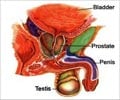Highlights:
- Prostate-specific antigen (PSA) test used for the screening of prostate cancer often results in false positive results.
- As a result, people are often over diagnosed and over treated for prostate cancer, which is usually non-aggressive.
- A genetic score can possibly identify the age men are likely to develop prostate cancer and the individuals that require PSA testing.
- The score, calculated from 54 single nucleotide polymorphisms, significantly predicted the age of the diagnosis of aggressive prostate cancer. The hazard ratio for aggressive prostate cancer was 2.9 times in men with high scores (in the top 2% of the score) as compared to men with average scores.
- The number of men who tested positive for PSA was higher for those with a high score.
- Around 25% men with a high score and a positive PSA test signaled the diagnosis of aggressive prostate cancer.
- People with low scores but high PSA levels had a lower risk.
- Though a family history of prostate cancer is related to prostate cancer risk, however, it did not predict the age of onset of the cancer, and did not improve prediction over the hazard score alone.
Further testing of the score will be needed before it can be widely used. In addition, it will have to be validated in people of other ethnicities as well.
About Prostate Cancer
Prostate cancer is a common cancer in men and is second only to lung cancer. Most men develop a non-aggressive form of the cancer that does not kill the patient. More aggressive forms are less frequent but often affect younger males. Prostate cancer usually does not cause symptoms early in the disease. A rectal examination during routine checkups can help to diagnose prostate cancer early.A blood test that measures the PSA levels has been used in the screening of the cancer. Although high levels could indicate the presence of a prostate cancer and require further testing, the PSA can sometimes increase in non-cancerous conditions like prostatic inflammation, and may result in false-positive results and requiring the patient to undergo unnecessary further testing, and sometimes aggressive treatments, which may actually not be needed.
Reference:
- Seibert TM et al. Polygenic hazard score to guide screening for aggressive prostate cancer: development and validation in large scale cohorts BMJ 2018;360:j5757. Doi: https://doi.org/10.1136/bmj.j5757















